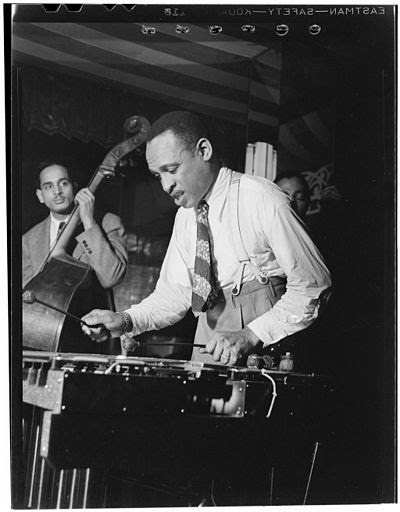It was the first visit of Jazz legend Lionel Hampton to England and one of his gigs was seemingly at Hanley Town Hall in north Staffordshire, according to G. A. Roberts, who captured the occasion in an article that appeared in the December 1956 issue cum grado, the student magazine of what was soon to become Keele University.
 |
| Photo by William Gottlieb |
According to Roberts, the band played one number without Hampton and when the great man was introduced to the audience there was a:
Deafening roar from the audience, deafening noise from the band. A lean light grey suited negro ran onto the stage acknowledging his reception. With a wealth of gesticulation, he stopped the band and then led them into another hectic number—loud, driving, swinging. We were away---from the beginning, Hampton’s tactics were clear ---he was going to produce such a dynamic, hypnotic, driving, compelling, metronomic beat that the audience would be goaded into a frenzy of excitement and enthusiasm…but twice on the evening Hampton sacrificed sheer beat for artistry.
He used the vibroharp to produce sounds of real beauty which even the band could not drown ; caressing the instrument so that its strange tones filled the echoing hall. But then, as though ashamed of his lapse of taste, he returned to the repetition of fast mechanical tunes. The audience loved it…
After the performance Roberts and two other enthusiasts were invited to interview Hampton in the green room. After the usual small talk came some gritty questions. One guest asked if the great jazz man was catering to the musical tastes of modern youth by playing rock and roll. Hampton replied that he wasn’t. ‘It was the old negro jazz’. He was then asked what he thought of Bill Haley.
“Oh, he’s not authentic. Why, that er…’Shake, Rattle and Roll’, Joe Turner was singing that before you boys were born. No, he’s not authentic.”
After that bombshell it was time to break up the party, and as he left Hampton aimed one parting shot at his interlocutors:
“If those cats want me to rock, well, I just rock”
So was opened a small window on the history of racial stereotyping, of jazz history and the beginnings of rock, on which I’m not qualified to comment. Interestingly, Roberts remarked on noticing a female saxophonist among Hampton’s troupe, ‘there was something incongruous at seeing such a startling woman holding an unwieldy saxophone’. Twenty five years later the great Lene Lovich, arguably the most original female rock musician of her generation, complained to an American reporter that the bosses at Stiff Records did not like to see her playing a saxophone, because ‘it was not nice’.
Incidentally, there is a You Tube video clip of Hampton playing ‘ Flying Home’ in 1957. [RRR]
